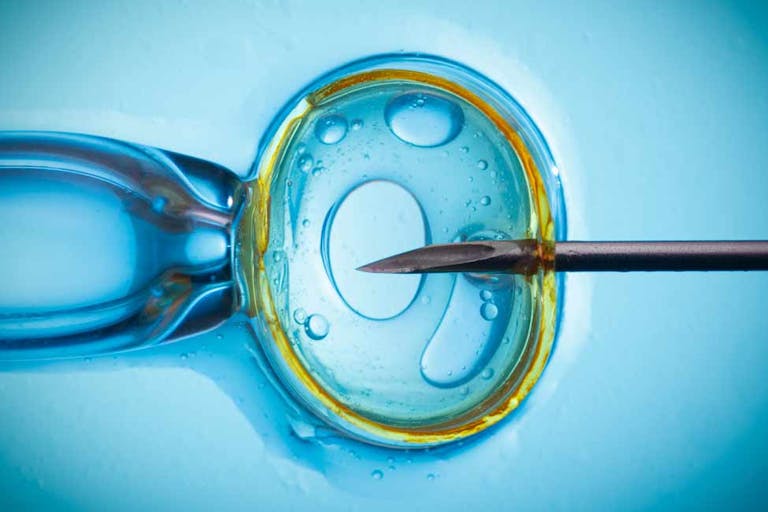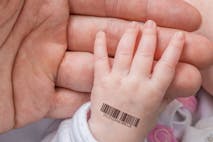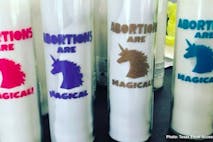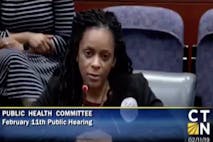
Abu Dhabi expands fertility industry to become 'IVF capital of the world'
Angeline Tan
·
Opinion·By Christina Marie Bennett
“I wish he’d never been born”: the misguided view of abortion as “mercy-killing”
Emily Rapp
Emily Rapp is a writer, a devoted mother, and a left-leg amputee who was once a poster child for the March of Dimes. Her son Ronan is living with Tay-Sachs, a devastating rare genetic disease. I first heard of Emily in a disheartening Time magazine article titled “Why a Mother would have aborted her son.”
It sprang from a Slate article Emily wrote where she said, “I’m so grateful that Ronan is my child. I also wish he’d never been born; no person should suffer in this way—daily seizures, blindness, lack of movement, inability to swallow, a devastated brain—with no hope for a cure. Both of these statements are categorically true; neither one is mutually exclusive.” She continues later, “I love Ronan, and I believe it would have been an act of love to abort him, knowing that his life would be primarily one of intense suffering.”
I don’t question Emily’s love for her son. Her writings reveal a brave, caring mother who is deeply committed to her child. I sympathize with her family in their pain. At the same time, I wholeheartedly disagree with the notion that abortion can ever be an act of love. “Sparing” a child from suffering by taking his life is a popular but dangerous idea. Abortion is never a merciful or compassionate act. Although a parent may feel motivated to end her child’s pain, it doesn’t justify the violence and cruelty of abortion.
This push toward abortion as a form of “mercy-killing” reminds me of African mothers who killed their children so they wouldn’t have to endure the torment of enslavement. Slavery was atrocious, but can you imagine the loss if Fredrick Douglas’s or Harriet Tubman’s mother had chosen to “spare” her child from the agony of life? Their endurance through suffering is what inspires us all.
Sara Carpenter was devastated when her doctor told her that the baby in her womb had spina bifida. She told Mail Online, “I tried to shake away the image I conjured in my head of a little boy, lonely and friendless, robbed of the most basic human functions.” After wrestling over her decision, Sara chose abortion stating, “I realized I couldn’t bring this child into the world, knowing the extent to which he would suffer. Andrew [my partner] and I talked long into the night, and finally agreed that ending the pregnancy was the kindest thing we could do for our son.”
Sara’s story caused me to think back to my college years. I was an assistant and friend to a young lady with spina bifida. We had interesting adventures together. I was just one of the people in her life who loved her. Though she faced physical difficulties, she was remarkably strong, determined, and personable. In some ways she had more experiences than I did. While I was single through most of college, she had more than one significant romantic relationship. She was not the picture of a “lonely and friendless” person. The kindest things her mother did were give birth to her and care for her with love.
Ninety percent of Down syndrome babies are murdered in the womb. Children are aborted for things as treatable as a cleft palate. Some doctors even argue that post-natal abortion and infanticide are merciful and morally acceptable. How far do we want to take this?
Article continues below
Dear Reader,
In 2026, Live Action is heading straight where the battle is fiercest: college campuses.
We have a bold initiative to establish 100 Live Action campus chapters within the next year, and your partnership will make it a success!
Your support today will help train and equip young leaders, bring Live Action’s educational content into academic environments, host on-campus events and debates, and empower students to challenge the pro-abortion status quo with truth and compassion.
Invest in pro-life grassroots outreach and cultural formation with your DOUBLED year-end gift!
There are questions we must ask ourselves. What measure of suffering could ever warrant a babies death? What messages are we believing and communicating when we agree with aborting the weak? What is our definition of love, and how does that include suffering? How do disabled children bring beauty into our lives? What do we think of the children who were given a wrong prognosis or the ones who overcame negative ones?
Aimee Mullins. Photo by David Shankbone.
Aimee Mullins‘ legs were amputated at birth. The doctor who delivered her told her parents that she would never walk. With the help of prosthetic legs, Aimee became a NCAA track star and a runway model. She travels the world speaking and is a spokesperson for L’Oréal makeup. She was named one of People Magazine‘s 50 most beautiful people.
Later in life, Amy ran into the doctor who gave her parents the tragic news. Over the years, he’d saved newspaper clips of all her accomplishments. He proudly told her, “You’ve made a liar outta me.”
Some babies will never accomplish what Aimee has, but they are still valuable simply because they are human. Tripp Roth was one of those little boys. His mother Courtney was a Reader’s Digest Hero of 2011. Tripp recently passed away from epidermolysis bullosa, or EB, a rare skin disease that caused him to be covered in blisters and sores. His disease wasn’t detected until after birth, but his case was so horrific that some encouraged her to “put him out of his misery.”
In an excerpt from her blog, Courtney wrote:
Tripp taught me love. He taught me love like I’ve never known it before. What I’ve learned most from him is unconditional love. A love so strong that nothing can break it, not even death. A love that shines through pain, anger, and exhaustion, but also through times of complete joy and trust. Tripp taught me that every day counts and every minute matters. He loved me with his whole tired little heart every minute he was alive. Never once while he was alive did I think that my job as a mom was hard. I was doing what I was supposed to be doing- all I knew how to do, and all I wanted to do. He led me through every day and every hour by showering me with love like I’ve never known before.
In a message to her son, she wrote, “I love you, my sweet little man and no one knows your heart like Mommy. And NO ONE knows when you are ready to leave this Earth, except God.” Tripp’s life has ended, but Courtney is determined to keep fighting for a cure for EB.
The human experience is intermingled with pain. It’s necessary to show compassion towards those facing challenging and traumatic situations. We also must uphold our value for life, even in the face of grave suffering. The dignity of life should be protected at all costs. Accusing and judging parents as selfish is not the route we should take. Rather, we seek to call others to a truer understanding of mercy and a greater reality of loving kindness.
Live Action News is pro-life news and commentary from a pro-life perspective.
Contact editor@liveaction.org for questions, corrections, or if you are seeking permission to reprint any Live Action News content.
Guest Articles: To submit a guest article to Live Action News, email editor@liveaction.org with an attached Word document of 800-1000 words. Please also attach any photos relevant to your submission if applicable. If your submission is accepted for publication, you will be notified within three weeks. Guest articles are not compensated (see our Open License Agreement). Thank you for your interest in Live Action News!

Angeline Tan
·
Issues
Angeline Tan
·
Guest Column
Emily Berning
·
Opinion
Nancy Flanders
·
Opinion
Mark Wiltz
·
Opinion
Mark Wiltz
·
Human Interest
Christina Marie Bennett
·
Media
Christina Marie Bennett
·
Activism
Christina Marie Bennett
·
Issues
Christina Marie Bennett
·
Activism
Christina Marie Bennett
·